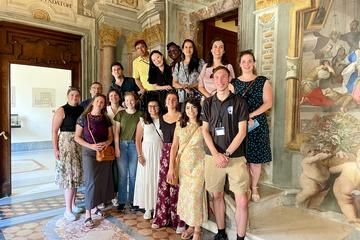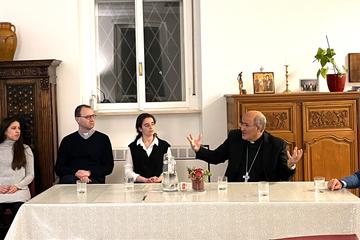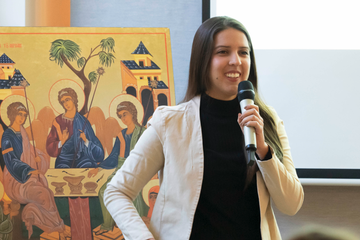In an opportunity to present the work of community members to an external audience, The Lay Centre held an “Open Day on Synodality” Nov. 12. The morning was rich in intellectual dialogue, held among Lay Centre residents and friends. Four scholars gave talks on topics directly or indirectly linked to the theme of synodality. The session was moderated by Loredana Fabijanic, an Angelicum doctoral student from Croatia.
A Brazilian doctoral student at the Pontifical Gregorian University, Bruno Hermes De Oliveira Santos presented some results from his research, which he conducted in the state of Acre, northwestern Brazil, part of the Amazon rainforest. His work is connected with two synods of the pontificate of Pope Francis: the Synod on the Amazon (2019), after which the pope published the post-synodal exhortation “Querida Amazonia” (Beloved Amazonia), and the ongoing Synod on Synodality (2021-2024).
- Maria Teresa Ávila: Lived synodality and the concept of ‘bridge-people’
- Aljaž Krajnc: ‘Religious diversity is willed by God’, a reflection on human fraternity
- Clemency Flitter: Synodality and inclusion in the Church of England
- Adrian Teodor Oancea: Synodality and autocephaly in the Eastern Orthodox Church
- WATCH ALL ‘DIES ACADEMICUS’ LECTURES ON OUR YOUTUBE PAGE
Santos’ sociological research is composed of field research and analysis. He conducted ethnographic research for about nine months in the Amazonian village of Assis Brasil, situated on the Acre River, which forms a natural border with Peru and Bolivia. Most people in the state live in rural areas; small towns are very far from each other.
Religious diversity is also a strong characteristic of the region. Most people are Evangelical Protestants. Although the presence of the Society of Jesus and other missionaries is recognisable, the lack of Catholic clergymen is notable. It is not possible to celebrate Sunday Eucharist regularly. Native communities often celebrate the Liturgy of the Word. Lay people and religious women often take on roles of community leadership.
However, he also noted that, especially among the elderly, a hierarchical view of the Church prevails in that they expect the clergy to lead most of the time. The idea of adopting a different model is more common among younger Catholics.
The Catholic Church finds many different expressions in the region, and there are many other alternatives for religious affiliation. There is no longer a “monopoly” of Catholics in the region, as was the case when Brazil was a Portuguese colony that welcomed many European Catholic missionaries.
Preachers in the Amazon are of different Christian denominations. Along with local traditional and indigenous leaders, they compete against each other for the people’s attention and membership. The faithful often do not notice a big difference between them, be they Catholic or Evangelical, and easily transit between one church and the other. In spite of that fluid sense of affiliation, Amazonian communities are very vibrant and autonomous, he noted.
Contributed:
Filip Veber
Joseph Tulloch


